

Copyleft. Copyleft symbol Copyleft (a play on the word copyright) is the practice of using copyright law to offer the right to distribute copies and modified versions of a work and requiring that the same rights be preserved in modified versions of the work.
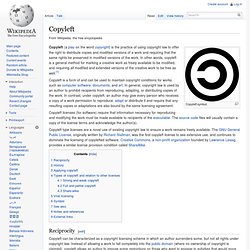
In other words, copyleft is a general method for marking a creative work as freely available to be modified, and requiring all modified and extended versions of the creative work to be free as well.[1] Copyleft is a form of and can be used to maintain copyright conditions for works such as computer software, documents, and art. In general, copyright law is used by an author to prohibit recipients from reproducing, adapting, or distributing copies of the work. In contrast, under copyleft, an author may give every person who receives a copy of a work permission to reproduce, adapt or distribute it and require that any resulting copies or adaptations are also bound by the same licensing agreement. Reciprocity[edit] History[edit] Some[who?] Creative Commons.
Licenses - ChooseALicense.com. Public License. About the License Mozilla is the custodian of the Mozilla Public License ("MPL"), an open source/free software license.
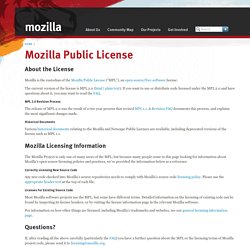
The current version of the license is MPL 2.0 (html | plain text). If you want to use or distribute code licensed under the MPL 2.0 and have questions about it, you may want to read the FAQ. MPL 2.0 Revision Process The release of MPL 2.0 was the result of a two year process that revised MPL 1.1. Historical Documents Various historical documents relating to the Mozilla and Netscape Public Licenses are available, including deprecated versions of the license such as MPL 1.1. Mozilla Licensing Information. The MIT License (MIT) The MIT License (MIT) Copyright (c) <year><copyright holders> Permission is hereby granted, free of charge, to any person obtaining a copy of this software and associated documentation files (the "Software"), to deal in the Software without restriction, including without limitation the rights to use, copy, modify, merge, publish, distribute, sublicense, and/or sell copies of the Software, and to permit persons to whom the Software is furnished to do so, subject to the following conditions: The above copyright notice and this permission notice shall be included in all copies or substantial portions of the Software.
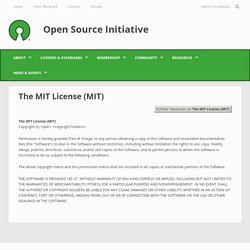
MIT License. MIT License. The MIT License is a free software license originating at the Massachusetts Institute of Technology (MIT).
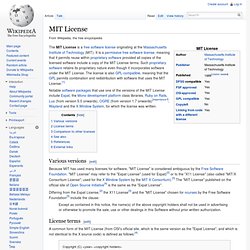
It is a permissive free software license, meaning that it permits reuse within proprietary software provided all copies of the licensed software include a copy of the MIT License terms. Such proprietary software retains its proprietary nature even though it incorporates software under the MIT License. The license is also GPL-compatible, meaning that the GPL permits combination and redistribution with software that uses the MIT License.[1] Various versions[edit]
MIT License - ChooseALicense.com. A short and simple permissive license with conditions only requiring preservation of copyright and license notices.
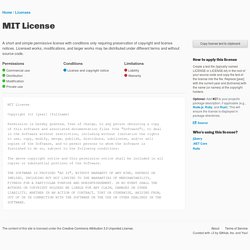
Licensed works, modifications, and larger works may be distributed under different terms and without source code. Mozilla Public License. The Mozilla Public License (MPL) is a free, open source, and detailed software license developed and maintained by the Mozilla Foundation.
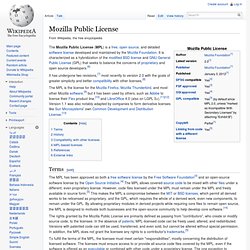
It is characterized as a hybridization of the modified BSD license and GNU General Public License (GPL) that seeks to balance the concerns of proprietary and open source developers.[6] It has undergone two revisions,[7] most recently to version 2.0 with the goals of greater simplicity and better compatibility with other licenses.[8] The MPL is the license for the Mozilla Firefox, Mozilla Thunderbird, and most other Mozilla software,[9] but it has been used by others, such as Adobe to license their Flex product line,[10] and LibreOffice 4.0 (also on LGPL 3+).[11][12] Version 1.1 was also notably adapted by companies to form derivative licenses like Sun Microsystems' own Common Development and Distribution License.[13] Terms[edit] History[edit] Compatibility with other licenses[edit] MPL-based licenses[edit] References[edit] External links[edit]
BSD licenses. BSD licenses are a family of permissive free software licenses, imposing minimal restrictions on the redistribution of covered software.
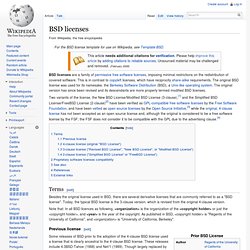
This is in contrast to copyleft licenses, which have reciprocity share-alike requirements. The original BSD license was used for its namesake, the Berkeley Software Distribution (BSD), a Unix-like operating system. The original version has since been revised and its descendants are more properly termed modified BSD licenses. Terms[edit] GNU General Public License. The GNU General Public License (GNU GPL or GPL) is the most widely used[5] free software license, which guarantees end users (individuals, organizations, companies) the freedoms to use, study, share (copy), and modify the software.
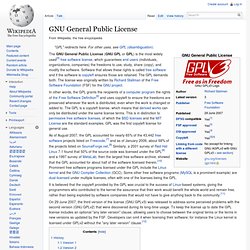
Software that allows these rights is called free software and if the software is copyleft ensures those are retained. Copyleft. A copyleft license uses copyright law in order to ensure that every person who receives a copy or derived version of a work can use, modify, and also redistribute both the work, and derived versions of the work URL = Copyleft is also a movement promoting the use of such licences and critiquing traditional copyright.
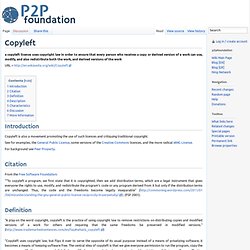
See for examples, the General Public License, some versions of the Creative Commons licences, and the more radical IANG License. For background see Peer Property. Peer Production License. The peer production license is an example of the Copyfarleft type of license, in which only other commoners, cooperatives and nonprofits can share and re-use the material, but not commercial entities intent on making profit through the commons without explicit reciprocity This version of the Peer Production License: a model for Copyfarleft was copied from the text "The Telekommunist Manifesto".
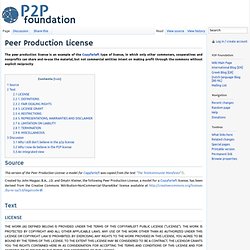
Created by John Magyar, B.A., J.D. and Dmytri Kleiner, the following Peer Production License, a model for a Copyfarleft license, has been derived from the Creative Commons ‘Attribution-NonCommercial-ShareAlike’ license available at a. B. C. D. E. F. G. H. I. Nothing in this License is intended to reduce, limit, or restrict any uses free from copyright or rights arising from limitations or exceptions that are provided for in connection with the copyright protection under copyright law or other applicable laws. d. to Distribute and Publicly Perform Adaptations. A. B. C. I. D. Creative Commons. = CC enables the creator of a work to predefine different licensing possibilities on a step-by-step basis. URL = A set of licenses created by Lawrence Lessig, but also a worldwide movement to promote open access to intellectual content.
See ICommons. If traditional copyright is based on the principle of "all rights reserved", then the CC licences are typified by the principle of "some rights reserved". Creative Commons. Copyfarleft. A proposal by Dmytri Kleiner, based on a critique of the approach by Creative Commons and other Copyleft approaches. "The main argument advanced in the essay is that artists can not earn a living from exclusivity of "intellectual property" and that that neither copyleft licenses like the GPL, nor "copyjustright" frameworks such as the creative commons, can help.
" Below you can find a list of already existing licenses clasified as Copyfarleft: Peer Production License Alan Toner: "“His suggestion is to establish a form of cooperative which would function in the same way as the copyright collection societies, such as GEMA in Germany which collects licenses for musical performances. Dmytri Kleiner: The Open Source Initiative. The Open Source Initiative.